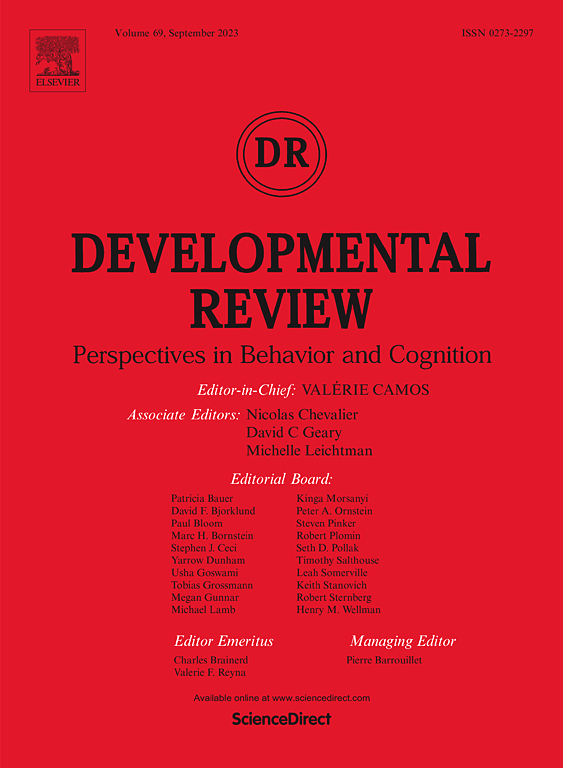A meta-analysis of word learning in autistic and neurotypical children: Distinguishing noun-referent mapping, retention, and generalisation
IF 5.6
1区 心理学
Q1 PSYCHOLOGY, DEVELOPMENTAL
引用次数: 0
Abstract
Autism is often characterised by significant language comprehension impairments. Differences in how autistic children learn words – including noun-referent mapping (unambiguous and referent selection), storage in long-term memory (retention), and extension of labels to novel referents (generalisation) – may explain their difficulties acquiring language. The present meta-analysis serves to profile the nature of differences between autistic and neurotypical children’s word learning and elucidate whether these differences are predicted by variations in experimental design, participant characteristics, or sample matching. A systematic literature search identified 40 studies investigating novel noun learning, containing 217 effect sizes, representing data from 1221 autistic children and 1445 neurotypical children. Multilevel models revealed that autistic children were significantly less accurate in their word learning than neurotypical children (Hedges’ g = 0.26, CI[0.08…0.43]). However, when analysing processes individually, a significant difference was detected for referent selection (Hedges’ g = 0.31, CI[0.08…0.55]), but not unambiguous noun-referent mapping (Hedges’ g = 0.08, CI[-0.05…0.21]), retention (Hedges’ g = 0.38, CI[-0.41…1.17]), or generalisation (Hedges’ g = 0.28, CI[-0.05…0.60]). Additionally, group differences in word learning were moderated by task requirements, participant characteristics, and sample matching. There was inconsistent evidence regarding publication bias for referent selection and retention, and some evidence of methodological bias for some measures. Our findings suggest that autistic children may principally struggle with disambiguating novel word meanings, presenting a clear target for interventions. Differences between autistic and neurotypical children were also smaller under specific environmental factors, providing direction for future research exploring how educational environments can influence autistic children’s vocabulary acquisition.
自闭症和神经正常儿童词汇学习的荟萃分析:区分名词-指称映射、保留和概括
自闭症通常以严重的语言理解障碍为特征。自闭症儿童学习单词的方式的差异——包括名词-指称映射(明确和指称选择)、长期记忆存储(保留)和将标签扩展到新的指称(概括)——可能解释了他们学习语言的困难。本荟萃分析旨在描述自闭症儿童和神经正常儿童词汇学习差异的本质,并阐明这些差异是否可以通过实验设计、参与者特征或样本匹配的变化来预测。一项系统的文献检索确定了40项关于新名词学习的研究,包含217个效应值,代表了1221名自闭症儿童和1445名神经正常儿童的数据。多水平模型显示,自闭症儿童的单词学习准确率明显低于正常儿童(Hedges’g = 0.26, CI[0.08…0.43])。然而,当单独分析过程时,在指称选择(Hedges ' g = 0.31, CI[0.08…0.55]),但在明确的名词-指称映射(Hedges ' g = 0.08, CI[-0.05…0.21])、保留(Hedges ' g = 0.38, CI[-0.41…1.17])或泛化(Hedges ' g = 0.28, CI[-0.05…0.60])方面检测到显著差异。此外,单词学习的组间差异受到任务要求、参与者特征和样本匹配的调节。关于参考文献选择和保留的发表偏倚的证据不一致,以及一些测量方法偏倚的证据。我们的研究结果表明,自闭症儿童可能主要是在消除新单词的歧义方面挣扎,这为干预提供了一个明确的目标。在特定的环境因素下,自闭症儿童与神经正常儿童之间的差异也较小,这为进一步研究教育环境对自闭症儿童词汇习得的影响提供了方向。
本文章由计算机程序翻译,如有差异,请以英文原文为准。
求助全文
约1分钟内获得全文
求助全文
来源期刊

Developmental Review
PSYCHOLOGY, DEVELOPMENTAL-
CiteScore
11.00
自引率
3.00%
发文量
27
审稿时长
51 days
期刊介绍:
Presenting research that bears on important conceptual issues in developmental psychology, Developmental Review: Perspectives in Behavior and Cognition provides child and developmental, child clinical, and educational psychologists with authoritative articles that reflect current thinking and cover significant scientific developments. The journal emphasizes human developmental processes and gives particular attention to issues relevant to child developmental psychology. The research concerns issues with important implications for the fields of pediatrics, psychiatry, and education, and increases the understanding of socialization processes.
 求助内容:
求助内容: 应助结果提醒方式:
应助结果提醒方式:


